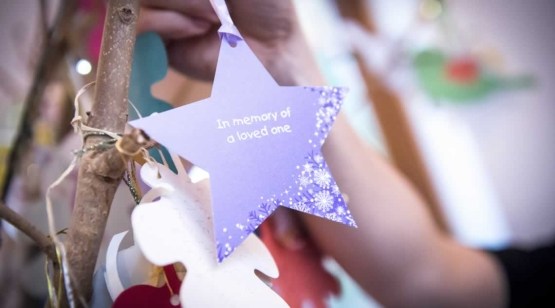Their smile lives on within the hearts of our families
Please accept our condolences at this sad and difficult time and thank you for taking on the role of Executor – you may find this challenging but also rewarding.
We hope you find comfort in the knowledge that your loved one's gift of a smile will provide support and care for families when they need it most. Find out more about the difference a smile could make.
Children’s Hospice South West greatly appreciates every gift of a smile and the difference they make.
Our online Book of Remembrance, ‘Their smile lives on’ has been created to shine a light on those who chose to remember Children’s Hospice South West in their Will and whose smiles live on within the hearts of our families. If you are the Executor of an estate and would like a name added to our page, please contact our legacy department on the contact details below.
Get in touch
Administering an estate and gathering the relevant documents may seem complicated. We hope that you find any answers you need on this page. However, if you would like to speak to someone, our Legacy Officer Andy Kemp would be more than happy to help.

Letting us know
Please let us know as soon as your loved one has died so that we can remove them from our mailing list.
All gifts in Wills are dealt with by our legacy officer, Andy Kemp. Please contact him at the start of the estate administration process to advise us of the gift left to Children’s Hospice South West and ensure you provide the following information:
- Title and full name of the deceased
- Last known address
- Date of Death
- A copy of the Will naming Children’s Hospice South West as a beneficiary.
- Grant of probate
- Please let us know the type of gift; Pecuniary, Specific, Residuary or Trust
- Executor/solicitor contact details
We will also require a copy of the administration accounts for our records. Accounts can simply be a list of incomings and outgoings. we cannot sign a receipt and discharge for a legacy until we have been able to see and approve them.

Making a payment
Payment of a gift can be made via:
- Cheque made payable to Children’s Hospice South West addressed to Little Bridge House, Redland Road, Fremington, Barnstaple, Devon, EX31 2PZ (please include a cover letter with the cheque)
- Bank transfer – please contact our legacy team for our bank details at legacies@chsw.org.uk. Please quote the surname and forename of the deceased as a reference when making payment.
We would love to know why your loved one chose to leave the gift of a smile in their Will and why it was important to them.
We appreciate that the administration of an estate can take a long time. Please let beneficiaries know of any issues, such as claims on the Estate, unforeseen or relatively large costs, any possible litigious or contentious disputes, or any simple requests by the family, which are not covered by the Will but could be easily and quickly dealt with.
From time to time, if we have not heard anything for a while, we may enquire on our own behalf or on behalf of all the charities how matters are progressing. This is not to hasten matters or put pressure on the Executor, but to give reassurance that everything is moving along satisfactorily, taking all issues into account. We understand that problems can come to light and Children’s Hospice South West, or one of the charitable beneficiaries, may be of help to you.

What if a Pecuniary gift has been left?
If the gift is for a specific amount of money, we simply require a copy of the part of the Will which states our benefit.
The Will shows whether there were any restrictions to the gift, and it ensures we use it as intended.
Please ensure that you place funds received in an interest-bearing account in the Executor’s name until the funds are distributed.
What if a Specific gift has been left?
Sorting out the personal possessions of a departed friend or relative is one of the most difficult aspects of an Estate administration. If a specific item such as clothes, paintings or furniture have been gifted, and they cannot be used at one of our hospices, we can help arrange for these to be sold at one of our shops. Please contact our legacy department who will be happy to help and may be able to arrange for the items to be collected. Alternatively, if you would prefer, these items can be sold and the proceeds paid to us.
What if a Residuary gift has been left?
Residue is that which remains after all the testamentary debts, tax due, pecuniary legacies and administration costs have been paid. Charity residuary beneficiaries are required by the Charity Commission to ask you for certain documents and for more detailed information as the administration unfolds.
Please provide us with:
- A schedule of assets and liabilities: a brief list of any assets, debts and other liabilities. This helps to identify if there are any charitable regulations which apply.
- If Inheritance Tax is payable, please provide a copy of any IHT calculation, or IHT400: This is an audit requirement where Inheritance Tax is being paid because of the various charity exemptions. Inheritance Tax can be extremely complicated so if you are in any doubt about the calculation, you may wish to refer to a solicitor who will be able to assist you.
- Deed/Memo of Appropriation: Where Capital Gains Tax is a possibility, appropriation of the relevant assets should be considered, and a Deed or Memorandum provided to the charity. Depending on the terms of the Will, the Deed/ Memorandum may need the consent of the charity.
What if a property and/or land is included in the estate?
If property or land is part of the estate, please can you:
- Provide property valuations: it is usually recommended that 2 valuations at the date of death are obtained, this helps with any HMRC enquiries and to verify the full value has been obtained.
- Provide an agent’s letter recommending acceptance of an offer: usually only required if you are accepting a low offer.
- Let us know if the sale value of the property exceeds the Executor’s probate value by more than the Capital Gains Tax (CGT) allowance as it will increase the amount of CGT payable. We recommend you seek advice from a solicitor.
- A surveyors’ report under S119 of the Charities Act, relating to the disposal of ‘charity land’. This is legally required where there is a sole charity beneficiary or where appropriation for the avoidance of Capital Gains Tax has occurred, and the land is deemed charitable. If you are unsure, a solicitor will be able to advise you about how to obtain the report.
Do I need to know about Inheritance Tax?
Inheritance tax is payable above the Nil Rate Band, which is currently £325,000. Gifts to charities are exempt from Inheritance Tax. A gift of 10% or more of an estate decreases the amount of Inheritance Tax payable on the remaining estate from 40% to 36%.
What is a Deed of Variation?
After someone has died, their Will may be changed within 2 years via a Deed of Variation. This has to be agreed by all those affected by the change in the Will. A gift of 10% or more of the total estate to a charity like Children’s Hospice South West can decrease the amount of Inheritance payable, benefitting all beneficiaries of the estate.
Do charities pay Income Tax?
Charities are able to reclaim any tax paid on their proportion of income during the estate administration period. Therefore, please provide us with a Tax Deduction certificate (R185) at the end of the estate administration.
What if there are investment portfolios?
Certain rules apply to the way shares are valued for Probate, namely that they are a quarter up from the share price of the day. Please obtain a valuation from an investment broker. Children’s Hospice South West should be given the opportunity at an early stage in the Estate administration to receive our share of the investments by direct transfer.
Gift in Wills jargon buster
Administrator –Those appointed to administer the estate if there is no Will or executor,
Assets – These are things that you own that are worth money. They could be your house, savings or shares. They could also be smaller items, such as jewellery or paintings.
Beneficiary – A person or organisation (such as a charity) who receives a gift from a Will.
Bequest – A gift in a Will.
Chattels – Personal items such as jewellery, antiques, car.
Codicil – A document that acts as an amendment to the Will (instead of rewriting it), which is signed and witnessed in the same way as a Will.
Conditional Legacy – A specific condition has to be met for the gift to take effect.
Deed of Variation – A legal document that can change a person’s Will after they have died.
Estate – The total value of everything owned.
Executor – The person named in a Will who administers the estate, ensuring they adhere to the testator’s wishes. This can be a friend, family member or solicitor.
Inheritance Tax (IHT) – Tax payable on the value of an estate above the Nil Rate Band (NRB). There may also be IHT payable on some lifetime gifts. IHT can be complex, so we recommend seeking professional guidance.
Intestate/Intestacy – When someone dies without making a Will. The law will decide how their estate is distributed under intestacy rules.
Legacy – This is a gift of assets (such as money or property) in a Will.
Legator – Person who has left a legacy in their Will.
Letters of Administration – Legal document that authorises an executor to administer an estate.
Liabilities – Financial costs such as tax and expenses which are payable from an estate.
Mirror Wills – These are 2 separate Wills that have the same wishes within both.
Mutual Wills - These are 2 separate Wills that have the same wishes within both. However, this type of Will cannot be altered after 1 person dies.
Nil Rate Band – This is the amount of money which can be paid from an estate without Inheritance Tax being payable. It is also possible to transfer any unused NRB from a deceased spouse. We recommend seeking professional guidance.
Personal representative – Person responsible for administering an estate.
Pecuniary – Gift of money of any size.
Power of Attorney – Written authorisation for 1 or more people to act on another’s behalf. This can be for health and welfare or financial affairs.
Probate – When a Will is proven in court and accepted as a valid document.
Residuary – The remainder of an estate after taxes and/or debts have been paid and all other gifts distributed.
Specific Gift – Specific items or group of items which can be sold for the purpose of raising funds.
Testator – Person who has written the Will.
Trust – Assets are held for a person/people to benefit from without them being the legal owner.
Trustee – Person or organisation empowered to administer assets held within trust.
Will – Legal document containing a person’s wishes for after they have died.












